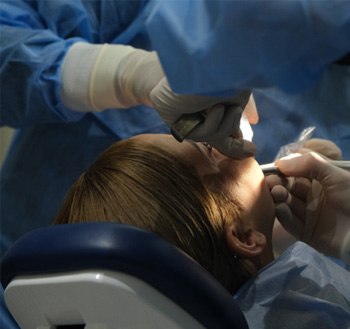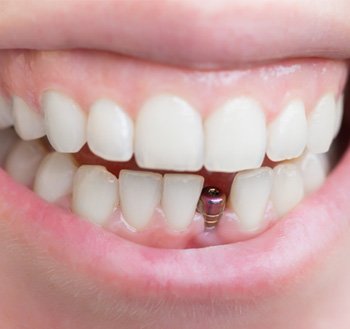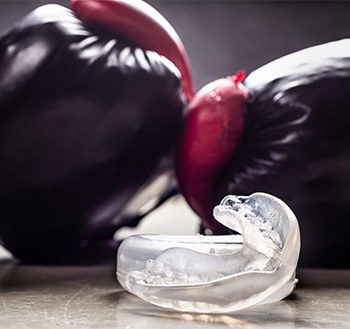Dental Implants San Antonio
The Ultimate Tooth Replacement

All of our tooth replacement options can restore your smile and boost your oral health. Regardless, dental implants stand a cut above the rest. It’s to the point that they’re called the “ultimate tooth replacement.” They provide the same beauty and function as natural teeth. Our team at Bianca Sanchez, DDS will gladly explain more if you’d like, and for details, just keep reading or book a consultation today for dental implants in San Antonio.
Why Choose Bianca Sanchez, DDS for Dental Implants?
- Dental Implant Treatment Done Entirely In-House
- CT Scanner for Advanced Treatment Planning
- Woman-Owned & Woman-Led Dental Practice
What Are Dental Implants?

In essence, dental implants are small titanium posts. They serve as alternate tooth roots that replace lost teeth.
Dental implants are quite different from dentures or dental bridges. Unlike the latter two options, they’re set in your jaw. Their titanium material then lets them fuse with nearby bone tissue. That way, the implants become secure parts of your jaw. They’ll be able to support a final restoration – a crown, bridge, or denture – after the fusion.
The 4-Step Dental Implant Process

Dental implants are the best tooth replacement option out there. Because of their unique way of replacing the roots of the missing teeth, dental implants offer various benefits you can’t find with other tooth replacement options, including additional stability, comfort, and longevity. To achieve this, getting dental implants requires a multi-step process that takes place over the course over the course of several months. Everyone’s treatment looks a little bit different, but here are the steps that you can expect.

Initial Dental Implant Consultation
First, you’ll discuss the implant treatment with Dr. Sanchez before surgery. This brief conversation allows her to know your smile goals, oral health, and other important information. These details help her understand if implants will be a good fit for you. Some patients require preliminary procedures, like gum disease treatment and bone grafting, before they can get implants. If this applies to you, we will help you get them scheduled. Once your gums and jawbone are in good shape, we can move onto planning the rest of your treatment.

Dental Implant Surgery
With approval from Dr. Sanchez, you’ll have the dental implant surgery performed right in our office. After numbing the area with a local anesthetic, an incision is made into the gum tissue so the dental implants can be surgically placed into the jawbone at strategic angles. Then, the gums are closed and protective caps are placed on the ends of the implants to keep them safe over the next few months as they heal.

Dental Implant Osseointegration & Abutment
After the surgery, your implants will slowly fuse with your jaw over 3-6 months. This process is called “osseointegration,” and it sets a foundation that keeps your new teeth strong. Once it’s done, Dr. Sanchez will place your abutments (i.e., a metal connector that is placed in your implant and holds the restoration). Impressions are taken and sent to the dental lab so your final restoration can be custom-crafted for you.

Delivery of Dental Implant Restoration
When you’ve recovered from the placement and abutment surgeries, you’ll visit us for your final restoration. This item will be a crown, bridge, or denture. (Which one you receive will depend on your oral health needs.) Then, you can show off your complete smile to the world!
Benefits of Dental Implants

Dental implants are often seen as the next best thing to natural teeth. Whether you have lost only one tooth or need to replace an entire arch of teeth, dental implants are an option worth considering. What makes dental implants such a popular treatment among dentists and patients alike? The answer lies in the many benefits that they offer. Below are some of the advantages of using dental implants to rebuild your smile.

Day-to-Day Benefits
There are several ways that dental implants can improve your day-to-day life:
- They Let You Eat What You Want: People who wear traditional dentures may have trouble with certain kinds of foods. This isn’t a problem with dental implants; they have stability and chewing power comparable to that of natural teeth, and as such, they will allow you to enjoy all your favorite foods without issue.
- They Help Improve Your Confidence: The prosthesis supported by your dental implants will be designed to blend in with your natural teeth, giving it a very lifelike appearance. Also, unlike traditional dentures, a dental implant prosthesis stays anchored in place at all times. These facts can help you feel a lot more confident about your restored smile.
- They are Easy to Take Care Of: You might be worried that dental implants will force you to dramatically change your oral hygiene routine. In reality, taking care of dental implants is similar to taking care of natural teeth; you can continue to brush and floss as you normally would.

Health Benefits
Having dental implants placed can ultimately benefit your oral health in the following ways:
- They Can Stop Bone Loss in Your Jaw: When your teeth are missing, the jawbone starts to deteriorate due to a lack of stimulation. However, dental implants can act as new tooth roots, thus putting a stop to bone loss.
- They Can Keep Your Remaining Teeth in Place: Empty space in your mouth can cause the remaining teeth to shift out of alignment, but you won’t have to worry about this happening if a dental implant is used to fill the gap.
- They Make It Easier to Maintain a Healthy Diet: Dental implants give you the freedom to eat virtually anything you want, so you shouldn’t have any trouble getting the nutrients you need to keep your body healthy.

Long-Term Benefits
There are plenty of reasons why dental implants are an excellent long-term solution for missing teeth:
- They Have a High Rate of Success: The vast majority of patients are able to continue enjoying their dental implants even after 20 years have passed.
- They Can Help You Look Younger: Tooth loss often leads to facial collapse, which can ultimately age your appearance. But since dental implants can stop bone loss in the jaw, they can help you avoid facial collapse, leaving you with a more youthful look.
- They Have Long Lifespans: Dental implants can often last for more than 30 years. They can even stay in your mouth for the rest of your life if you give them the right kind of maintenance.
Maintaining & Caring for Your Dental Implants

Dental implants in San Antonio are designed to last a lifetime. If you take good care of them, you can expect them to provide you with a strong, healthy, and confident smile for many years to come. But just how can you keep them in good shape? Here are some helpful tips:

Make Oral Hygiene a Priority
Even though dental implants cannot get cavities, they can still be affected by oral bacteria, which can attack the surrounding gum and bone tissue. To prevent that from happening, you should maintain a thorough oral hygiene routine.
- Brush your teeth twice a day. Be sure to clean the area along your gumline.
- Floss daily. You may need to use a floss threader or water flosser to clean around and beneath your dental implants.
- Use an antibacterial mouthwash. This can help to reduce oral bacteria.

Eat a Healthy Diet
Dental implants can handle virtually any food, so you should feel free to indulge in all of your favorite snacks and meals. However, it is important to remember that, just like natural teeth, some foods are better for implants than others. Try to enjoy hard, sticky, and sugary foods only in moderation. Instead, center your diet on nutrient-rich items that support oral and overall health. For example, you should be sure to get enough calcium and vitamin D.

Break Bad Habits
Some bad habits that can negatively affect dental implants include:
- Smoking (and other uses of tobacco products) greatly increases the risk of dental implant failure. You should do all you can to kick the habit.
- Using your teeth as tools. Using your restored teeth to open packages or trim your fingernails could cause them to break.

Protect Your Dental Implants
There are two types of mouthguards that might be beneficial for you:
- A sports mouthguard is recommended for anyone who enjoys activities that have a risk of facial injury. A custom mouthguard from a dentist is superior to those that can be purchased over the counter.
- A nightguard can be important if you tend to grind and clench your teeth while you are asleep. It places a protective barrier between the upper and lower teeth that can reduce the risk of damage to both natural teeth and dental implants.

Schedule Regular Dental Checkups
You should visit us for a checkup every 6 months or so, even if you no longer have any natural teeth. During these appointments, we can:
- Check on the health of your oral tissues.
- Examine your implants and look for signs of any issues that may need to be addressed.
- Remove your restorations and clean around your implant abutments.
- Answer any questions you have about how to take excellent care of your restored teeth.
Dental Implant Post-Op Instructions

After your dental implant surgery, you will need to go through a recovery period. While that might sound a bit intimidating, it is really nothing to worry about. Our team will provide detailed post-op instructions to support your body’s natural healing process. Here are some of the guidelines that we typically provide for patients:

What to Do Directly After Dental Implant Surgery
In the days after your surgery, blood clots should form at your surgical sites. They are important for your body’s healing process, so you should be careful not to disturb them. Here are some tips to that end:
- Do not spit vigorously. Instead, swallow extra saliva or use tissues to absorb it.
- Do not smoke or use drinking straws. The suction action can be bad for blood clots.
- Do not touch your surgical sites with your tongue or fingers.

Common Side Effects When Recovering from Dental Implant Placement
During the first few days after your surgery, you might experience:
- Intermittent bleeding. This may go on for several days. Gauze and light pressure can help to manage it.
- Swelling can increase over the first 72 hours and might last for up to a week or longer. Cold compresses can minimize it.
- General discomfort. Pain medication and rest can reduce discomfort.
If you notice any severe, unusual, or prolonged symptoms after your surgery, contact our team right away for assistance.

Your Diet After Dental Implant Surgery
At first, you should eat a no-chew diet. This can include things like mashed potatoes, meal replacement shakes, ice cream (without hard add-ins), pudding, and brothy soups. When you feel up to it, you can progress to foods that are fork-tender, like meatloaf, scrambled eggs, and pasta. After the soft tissue at your surgical sites heals, you may eat what you like in moderation. However, you should continue to be cautious with any hard or tough foods.

Post-Op Health & Oral Hygiene
Oral hygiene is extremely important during the post-op period. Here are some guidelines to maintain a clean mouth:
- You can start brushing your teeth the day after your surgery. Be very careful around your surgical sites.
- Regularly rinse your mouth with warm salt water to manage inflammation.
- If you use a mouthwash, avoid varieties that are high in alcohol.
- Follow other oral hygiene instructions provided by our team.

What to Do After Your New Teeth Are Attached
After your new crown, bridge, or denture is attached to your dental implants, there should be no downtime. Although you might experience minor sensitivity in your gum tissue, you can start using your new teeth right away! Of course, you should call us if you run into questions or concerns about how to care for your beautiful new teeth.
Dental Implant FAQs
How Long Do Dental Implants Last?
The lifespan of dental implants in San Antonio can vary from case to case. Often, they last for 30 years or longer. In fact, for some people, they last for an entire lifetime!
Of course, whether or not your dental implants reach their potential for longevity depends on several factors. Our team can coach you to help you take good care of your new teeth. For example, we may advise you to eat a healthful diet, keep up with an excellent oral hygiene routine, and attend regular dental checkups.
Does Getting Dental Implants Hurt?
You should feel little to nothing during the surgery itself. Our team offers multiple forms of sedation, which can help you to stay calm, relaxed, and comfortable while we are placing your dental implants.
Once any anesthesia and sedation wear off, you can expect to experience some soreness and swelling. Most people are feeling fairly normal within a week or two. In the meantime, taking pain medications, getting plenty of rest, and eating a soft diet can help to minimize any discomfort.
What Can Cause Dental Implants to Fail?
Dental implant failure is relatively rare, but when it does occur, it may be due to:
- When harmful bacteria attack the tissue around an implant, they can cause so much damage that the implant loses its base of support. Poor oral hygiene is often a contributor to this problem.
- Failed osseointegration. Due to underlying medical conditions or other factors, the implants may not successfully bond with the surrounding tissue.
- Severe teeth grinding and clenching can place pressure on the implants and damage the surrounding tissue. An accident could also cause facial injuries that affect dental implants.
Our team can provide tips to help you keep your risk of implant failure to a bare minimum.
How Long Does It Take to Recover from Dental Implant Surgery?
Most people are able to return to work within a day or two of their surgery. The soft tissue at your implant sites may feel normal within just a couple of weeks. However, it can take several months for the jawbone to fully heal and integrate with your implants.
During the initial part of your recovery, you may need to adjust your habits by getting extra rest and eating a no-chew diet. Later, though, you may be able to resume a fairly normal routine, even while your bone is still healing. You will just need to be careful to avoid activities that might interfere with the osseointegration process. For example, you should prioritize your oral hygiene. You may also have to eat a soft diet with foods that are easy to chew with your remaining natural teeth.
Can I Get Dental Implants If I Smoke?
As your implant dentist in San Antonio, Dr. Sanchez and our team will consider a range of factors before determining whether you are a good candidate for dental implants. Smoking is not an absolute contraindication for treatment. However, smoking is a threat to dental implants and can greatly increase the risk of them failing. Therefore, we strongly recommend that you kick the habit. At the very least, you should avoid smoking during the weeks before and after your implant surgery.
